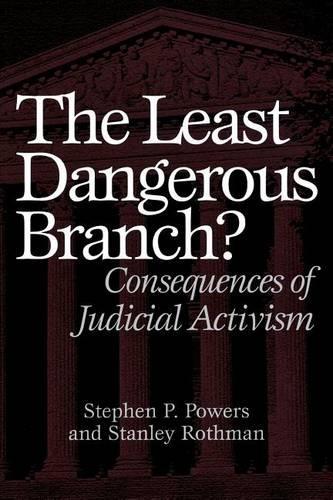
The Least Dangerous Branch: Consequences of Judicial Activism
(Paperback)
Available Formats
Publishing Details
The Least Dangerous Branch: Consequences of Judicial Activism
By (Author) Stephen P. Powers
By (author) Stanley Rothman
Bloomsbury Publishing PLC
Praeger Publishers Inc
30th November 2002
United States
Classifications
Tertiary Education
Non Fiction
Private or civil law: general
Central / national / federal government policies
347.7301
Physical Properties
Paperback
232
Description
Assesses the impact of judicial intervention on busing, affirmative action, prisons, mental health institutes, law enforcement and electoral redistricting. Powers and Rothman explore the impact of the federal courts, perhaps misleadingly characterized by Alexander Hamilton and legal scholar Alexander Bickel as "the least dangerous branch." They provide a brief account of the development of constitutional law and an overview of the judiciary's impact in six controversial areas of public policy. They explore busing, affirmative action, prison reform, mental health reform, procedural reforms in law enforcement, and electoral redistricting. In each of these areas, they review important cases bearing on the particular policy and then provide a review of the social science evidence in order to assess the degree to which the courts have impacted policies and the consequences of that intervention. Courts do not really make policy in the way that legislatures or administrative agencies do. As Powers and Rothman make clear it is more accurate to say that they direct and redirect policy as it is implemented. Courts do this in the process of interpreting the constitution, statutes, and particular administrative practices or conditions. Thus, the judicial contribution to policy-making involves infusing constitutional rights into the realm of public policy. As government has grown, the courts have become more powerful because they have done more and more of this. Powers and Rothman conclude that judicial intervention in public policy has often brought about undesirable consequences, sometimes even for the intended beneficiaries of government intervention. A provocative work of particular use to scholars, students, policy makers, and other researchers involved with public policy, the courts, constitutional law, and the American governmental process.
Reviews
"A new, wide-ranging, and provocative critique of judicial activism."-Roger Clegg General Counsel Center for Equal Opportunity
"A scholarly, modulated, but ultimately devastating examination of the ways in which the Supreme Court, and American courts generally, have successfully taken control of public policy making in critical areas of our national life."-Richard R. Morgan Bowdoin College
"This book is a comprehensive and penetrating analysis of judicial intervention into policy arenas normally reserved for legislatures. Its scope is unusually broad, covering judicial activism in school desegregation, affirmative action, voting, mental health, and prison reform. While sometimes critical of judicial excesses, the discussion is balanced by acknowledging the necessity of court action after legislative default, especially in the civil rights area. The writing avoids legal terms and technicalities, producing a very approachable and useful text for all students of social policy and constitutional law."-David J. Armor Professor of Public Policy School of Public Policy George Mason University
"Tocqueville warned that the Supreme Court is not the least but potentially the most dangerous branch of our national government. Powers and Rothman's highly readable and informative book amply corroborates this judgement in area after area. There is little that is more important, in my opinion, than that the American people come to understand this."-Professor Lino Graglia University of Texas
Recommended. General readers and lower-division undergraduates and above.-Choice
"Recommended. General readers and lower-division undergraduates and above."-Choice
Author Bio
STEPHEN P. POWERS is a Research Associate at the Center for the Study of Social and Political Change, Smith College. STANLEY ROTHMAN is Mary Huggins Gamble Professor Emeritus of Government and Director of the Center for the Study of Social and Political Change, Smith College.
